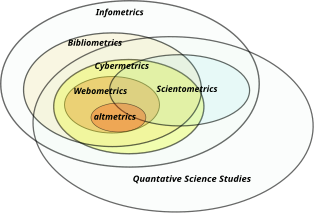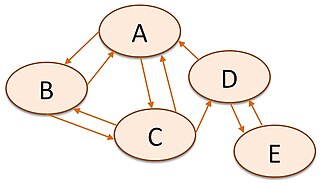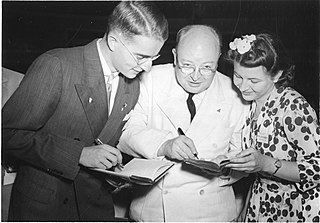
Information science is an academic field which is primarily concerned with analysis, collection, classification, manipulation, storage, retrieval, movement, dissemination, and protection of information. Practitioners within and outside the field study the application and the usage of knowledge in organizations in addition to the interaction between people, organizations, and any existing information systems with the aim of creating, replacing, improving, or understanding the information systems.

The science of webometrics tries to measure the World Wide Web to get knowledge about the number and types of hyperlinks, structure of the World Wide Web and using patterns. According to Björneborn and Ingwersen, the definition of webometrics is "the study of the quantitative aspects of the construction and use of information resources, structures and technologies on the Web drawing on bibliometric and informetric approaches." The term webometrics was first coined by Almind and Ingwersen (1997). A second definition of webometrics has also been introduced, "the study of web-based content with primarily quantitative methods for social science research goals using techniques that are not specific to one field of study", which emphasizes the development of applied methods for use in the wider social sciences. The purpose of this alternative definition was to help publicize appropriate methods outside the information-science discipline rather than to replace the original definition within information science.
Citation analysis is the examination of the frequency, patterns, and graphs of citations in documents. It uses the directed graph of citations — links from one document to another document — to reveal properties of the documents. A typical aim would be to identify the most important documents in a collection. A classic example is that of the citations between academic articles and books. For another example, judges of law support their judgements by referring back to judgements made in earlier cases. An additional example is provided by patents which contain prior art, citation of earlier patents relevant to the current claim. The digitization of patent data and increasing computing power have led to a community of practice that uses these citation data to measure innovation attributes, trace knowledge flows, and map innovation networks.
The Association for Information Science and Technology (ASIS&T) is a nonprofit membership organization for information professionals that sponsors an annual conference as well as several serial publications, including the Journal of the Association for Information Science and Technology (JASIST). The organization provides administration and communications support for its various divisions, known as special-interest groups or SIGs; provides administration for geographically defined chapters; connects job seekers with potential employers; and provides organizational support for continuing education programs for information professionals.
The Journal of the Association for Information Science and Technology is a monthly peer-reviewed academic journal covering all aspects of information science published by Wiley-Blackwell on behalf of the Association for Information Science and Technology. The journal publishes original research and rapid communications, as well as book reviews and announcements of the association. Occasional special issues appear with contents focused on a single topic area.
Bibliographic coupling, like co-citation, is a similarity measure that uses citation analysis to establish a similarity relationship between documents. Bibliographic coupling occurs when two works reference a common third work in their bibliographies. It is an indication that a probability exists that the two works treat a related subject matter.
The Science Citation Index Expanded is a citation index originally produced by the Institute for Scientific Information (ISI) and created by Eugene Garfield.
Information seeking is the process or activity of attempting to obtain information in both human and technological contexts. Information seeking is related to, but different from, information retrieval (IR).
Nicholas J. Belkin is a professor at the School of Communication and Information at Rutgers University. Among the main themes of his research are digital libraries; information-seeking behaviors; and interaction between humans and information retrieval systems. Belkin is best known for his work on human-centered Information Retrieval and the hypothesis of Anomalous State of Knowledge (ASK). Belkin realized that in many cases, users of search systems are unable to precisely formulate what they need. They miss some vital knowledge to formulate their queries. In such cases it is more suitable to attempt to describe a user's anomalous state of knowledge than to ask the user to specify her/his need as a request to the system.

The Annual Review of Nuclear and Particle Science is a peer-reviewed academic journal that publishes review articles about nuclear and particle science. As of 2023, Journal Citation Reports lists the journal's 2022 impact factor as 12.4, ranking it first of 19 journal titles in the category "Physics, Nuclear" and second of 29 journal titles in the category "Physics, Particles and Fields". Beginning in 2020, the Annual Review of Nuclear and Particle Science is published open access under the Subscribe to Open (S2O) publishing model.
Information behavior is a field of information science research that seeks to understand the way people search for and use information in various contexts. It can include information seeking and information retrieval, but it also aims to understand why people seek information and how they use it. The term 'information behavior' was coined by Thomas D. Wilson in 1982 and sparked controversy upon its introduction. The term has now been adopted and Wilson's model of information behavior is widely cited in information behavior literature. In 2000, Wilson defined information behavior as "the totality of human behavior in relation to sources and channels of information".
A library and information scientist, also known as a library scholar, is a researcher or academic who specializes in the field of library and information science and often participates in scholarly writing about and related to library and information science. A library and information scientist is neither limited to any one subfield of library and information science nor any one particular type of library. These scientists come from all information-related sectors including library and book history.

Watson Davis (1896–1967) was the founder of the American Documentation Institute (ADI), the forerunner of the Association for Information Science and Technology, and a pioneer in the field of Library and Information Science.

Claire Kelly Schultz was an American computer consultant and academic. She was a leading figure in the early development of automated information retrieval systems and information science. A "documentalist", she was particularly known for her work in thesaurus construction and machine-aided indexing, innovating techniques for punch card information retrieval.
Helen Brownson was a United States federal government employee and a pioneer in the development of the field of information science. She is credited with popularizing the idea of the thesaurus as it applies to information science. She founded the journal the Annual Review of Information Science and Technology (ARIST).
Alberto Frederick Thompson was an American chemist and nuclear scientist.
David Bawden is a British information science scholar. He is a professor in the department of Library and Information Science at City, University of London. He is editor of the Journal of Documentation and has written or coauthored several books.
Carlos Albert Cuadra was an American computer scientist and documentary filmmaker. He was a pioneer in the creation of online databases and was honored with the Award of Merit from the Association for Information Science and Technology.
The Award of Merit is bestowed by the Association for Information Science and Technology. It is an annual prize to an individual for a lifetime of achievement that recognizes sustained contributions to and/or achievements in the field of information science and/or the professions in which it is practiced. The Award of Merit was first given in 1964 to Hans Peter Luhn.
Tefko Saracevic is professor emeritus at the School of Communication and Information at Rutgers University. He is a contributor to the theoretical concept of relevance and a prominent information scientist. He has been President of the Association for Information Science and Technology Born November 24, 1930, in Zagreb, Croatia came to U.S., 1959; naturalized, 1964.




